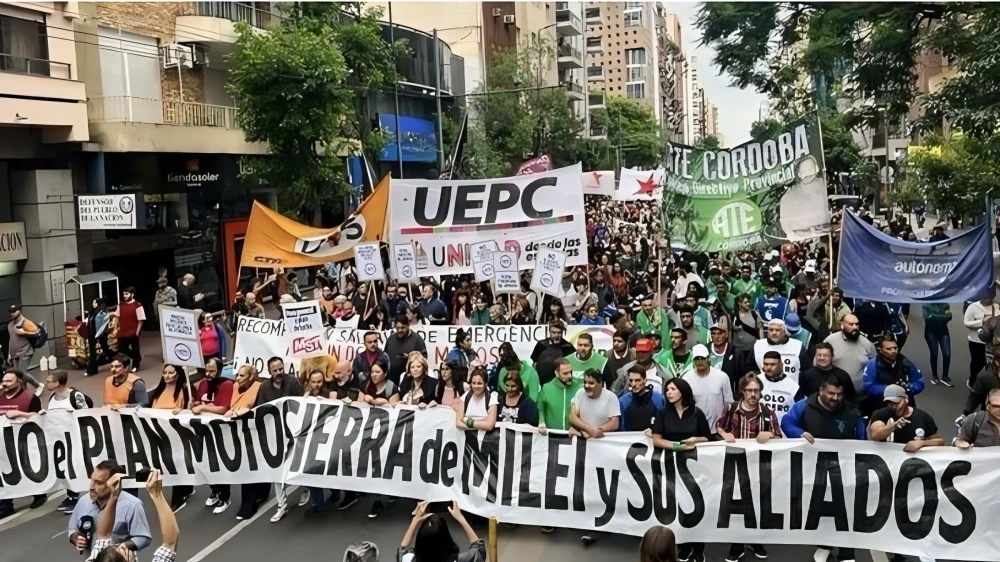Argentina’s National Strike Is Challenging Economic Reforms, Presenting a Difficult Test for the New President
Introduction: Less than 45 days into his presidency, Argentina’s largest labor union has announced a statewide general strike, posing a serious threat to President Javier Milei. Confederación General del Trabajo (CGT) and other union groups planned this walkout, which is a major test for Milei, who has proposed drastic measures to deregulate the country’s economy. An examination of the possible impact on Milei’s economic program is being closely monitored by analysts as thousands of workers walk to the streets in protest.
Argentina’s National Strike Is Challenging Economic Reforms
Background: Right-wing leader Javier Milei promised Argentina economic “shock therapy” when he took government. The nation is currently experiencing a severe economic crisis, as evidenced by high rates of poverty and an annual inflation rate above 211%. Dollarization of the economy, dismantling of the national bank, and privatization of the pension system are among Milei’s suggested remedies. But these actions have provoked criticism, which led to the countrywide walkout.
The General Strike: To express dissatisfaction with Milei’s economic changes, the CGT, siding with the opposition, has called for a general strike. The unusual speed of this strike indicates the seriousness and ferocity of resistance to the policies of the new government. It is anticipated that thousands of workers will take part, which will put Milei’s plan for a deregulated economy to the test.
Government Reaction: Milei’s administration has adopted a resolute position in the wake of the strike. A day’s pay reduction will be taken away from public employees who join the strike, and an anonymous hotline has been set up by the government for reporting any suspected threats or coercion to stop workers from joining. The government’s aim to lessen the influence of the labor movement is evident in this proactive approach.
Analysts’ Views: Although the present strike is unlikely to have a major impact on Milei’s policies in the near future, analysts think it might be the start of a larger labor movement that could cause economic disruptions. assurance.According to Jimena Blanco, head of risk consulting for Verisk Maplecroft in the Americas, the strike is currently more of a political litmus test for labor organizations in an effort to bolster their base of support. She does, however, issue a warning that the movement may gain momentum as the effects of the economic shock plan become clear and might undermine investor confidence.

Historical Context: Blanco draws comparisons with Argentina’s past to emphasize the use of strikes by Peronist-aligned unions during the late 1980s hyperinflation crisis, which ultimately led to the overthrow of the government. Even if a similar tactic might not be anticipated right away, labor action that persists could become a major disruption if it turns violent, harming property and decreasing investor interest.
Public opinion: The highly politicized nature of the unions may have a negative effect on public opinion, according to Nicolas Saldias, senior analyst for Latin America at the Economist Intelligence Unit. The strike’s early in Milei’s term may not sit well with many Argentinians, as the unions are unpopular with the general public. Saldias highlights that non-Peronist parties have backed the government because of its quick action to expedite changes during its honeymoon time.
Future Implications: Although Saldias notes that if the economy does not rebound quickly, subsequent strikes may have a more substantial effect on Milei’s agenda than the current one. The success or failure of these initiatives will probably determine the course of future labor movements and their impact on Argentina’s economic environment, as Milei continues to press for economic reforms.
In conclusion, President Javier Milei of Argentina is facing a difficult situation as a national strike that is opposing his economic measures. The result of this test will not only impact the nation’s immediate destiny but also the course of Milei’s expansive economic program. The country is keeping a careful eye on the workers’ protests, wondering what impact they might have on Milei’s shock treatment and Argentina’s economic stability.
You may also Read our Finance, World News, Local News, Health, Food, and Education articles.
খাসটাইমস বাংলা সম্পর্কে আরও বিস্তারিত ও নতুন খবর জানতে ক্লিক করুন। সব ধরনের ব্রেকিং, আপডেট এবং বিশ্লেষণ সবার প্রথম বাংলায় পড়তে ক্লিক করুন।

